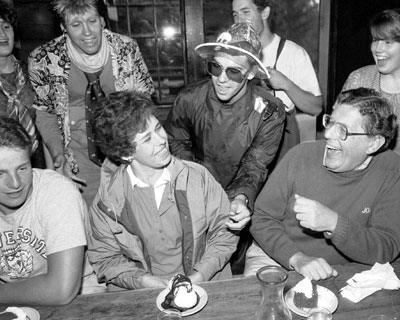
Photo source: Dartmouth.edu
With the Class of '91 25th reunion coming up in June, I've been digging into my personal archives from my Dartmouth days. Last night I was going through some old letters sent to me by my father. Remember those days? real letters mailed in envelopes affixed with stamps? Inside the envelope I found this article on James Freedman published by Harvard Magazine in their May-June 1989 issue. My father Jeff Field and President Freedman are both Jewish intellectuals who shared a love for books and for arcane knowledge. As mentioned in the article, at the time of its writing in 1989, President Freedman possessed over 4,500 books, all hard cover copies and like my own dad he was always combing the local used bookstores for additions to his collection.
I remember the struggles that ensued as President Freedman took the reins and tried to turn the Dartmouth campus's reputation from "life of the party to life of the mind" as the article states. I for one appreciated his efforts to foster a more intellectual environment on campus, though I know they were not welcomed by all.
Dartmouth had--and probably still has--a well-earned if somewhat dubious reputation for being a party school, and also a training ground for future professionals, especially in the fields of law, medicine, finance, engineering, and business. For many of my fellow '91s, Dartmouth was an intermediate stomping ground between an elite prep school and an elite professional school. As I recall, students attracted to the "life of the mind" for its own sake were rarities, and it was also rare for Dartmouth graduates to go on to earn Ph.D.s and become professors. For many students at Dartmouth as elsewhere, the idea of preparing for a life of scholarship was not as attractive as the more lucrative prospect of a life of law, medicine, or business.
Thankfully I didn't share that sentiment. Quite the opposite, I revered and worshipped our professors, and wanted to be like them: wise, witty, erudite, with a roomful of books and headful of ideas. Inspired and encouraged by my professors in Chinese studies and history, I went on to Columbia to earn a Ph.D. in East Asian Languages and Cultures. Now, fifteen years since earning my terminal degree, I'm involved in a bold venture by Duke University and its partners Wuhan University and Kunshan, to set up a liberal arts college in China with a curriculum designed to meet the challenges of the 21st century and beyond.
In rereading this article on President Freedman more than 25 years later, I look at his achievements with the eyes of a university administrator and marvel at all of his great accomplishments and the enormous positive impact that he had on my alma mater. I wish that President Freedman were still alive today so that I could seek out his own wise counsel. Alas, he died in 2006, but thankfully not before passing on some of his hard-earned wisdom through two books he wrote on liberal education. Those who wish to read more about President Freedman and his achievements can read this obituary published on the Dartmouth College website.
While I did not have any direct interactions with President Freedman while at Dartmouth other than shaking hands with him during our Commencement Ceremony in June 1991, I do remember hearing him give a speech in which he mentioned the impact that reading the novel Arrowsmith by Sinclair Lewis had on him as a youth. I read the novel soon after hearing his talk and I'd like to say that it had an impact on me too, though not as profound as it had on him.
Which brings me to an important point, and one with which I'm sure President Freedman would agree. While at Dartmouth during those four years, perhaps my most valuable education was that gained by reading novels, books of poetry, essays, and articles, not because they'd been assigned for a particular course, but because they'd been recommended by a friend, a teacher, a mentor, or a loved one. Sharing those books and ideas with others in my life, whether fellow students, professors, administrators, or friends, was one of the most rewarding aspects of my four years at Dartmouth.
Certainly as a student at Dartmouth, the books and articles that I read for my courses and the lectures I heard and discussions I had with others in class helped to shape and hone my intellectual skills and helped me to read other works of literature with a keener eye and a broader perspective. Nevertheless, it is still my firm belief that the surest road to learning is the unique path that one carves out for oneself, aided by the advise and counsel of those who are wiser. And while I have yet to achieve the impressive number that was in President Freedman's own book collection, I still count myself a voracious consumer of literature in many different fields and in at least more than one language. And I wonder if I would have ended up where I am today had President Freedman not been at the helm of my alma mater, encouraging us all to be the life of the party and to cultivate the life of the mind.